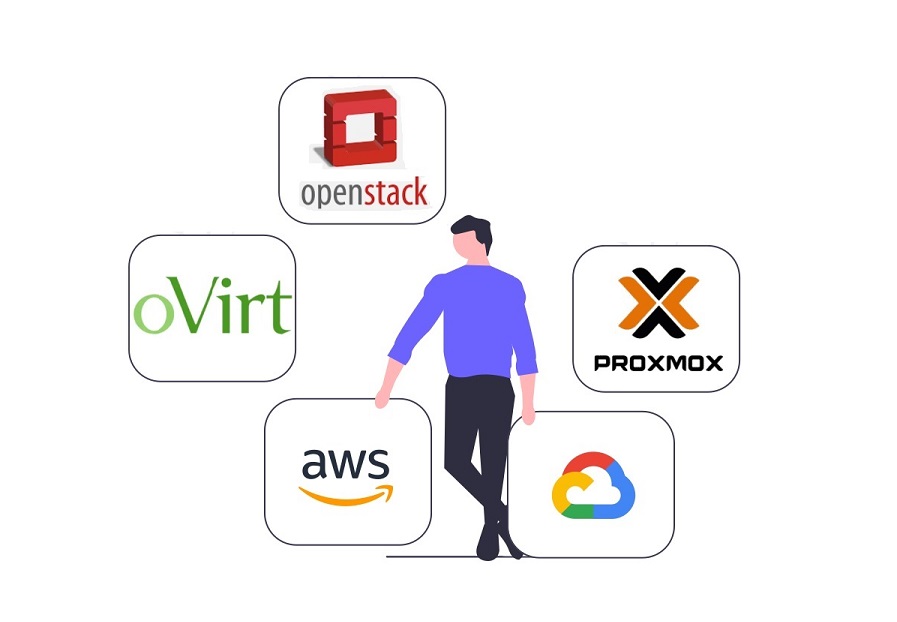
Infrastructure as a Service (IaaS) is a revolutionary cloud computing solution that allows businesses to access a fully managed and maintained array of hardware, storage, servers, and other essential infrastructure components through a third-party provider. With IaaS, organizations no longer need to invest in or manage their physical infrastructure. Instead, they can easily run their applications and services on the provider’s network. Some of the top IaaS providers in the market include Amazon Web Services (AWS), Microsoft Azure, and Google Cloud Platform (GCP). In this article we will cover the top alternatives to OpenStack in 2023 for web hosting companies.
What is OpenStack?
OpenStack, the powerful and flexible open-source software platform, is revolutionizing the way cloud computing infrastructure is built and managed. With its robust set of tools and technologies, organizations can easily deploy scalable, reliable, and cost-effective infrastructure for both public and private clouds. OpenStack empowers users to take control of their computing, storage, and networking resources and provides a user-friendly dashboard for administrators to monitor and manage the infrastructure with ease. The platform’s modular design and high configurability allow businesses to create custom cloud infrastructure that meets their unique needs. With a thriving community of contributors and users and support from top technology companies, OpenStack is the future of cloud computing infrastructure.
OpenStack has gained popularity as a free and open-source software platform for building and managing cloud computing infrastructure. But, is it the right choice for small and medium businesses?
Why webhosts shy away from OpenStack implementation?
- Complexity: OpenStack is a highly complex platform that requires a significant amount of technical expertise to deploy, operate, and maintain. Small and medium businesses may not have the resources or manpower to invest in building and maintaining such a complex platform, making it a challenging solution for them.
- High Cost: Despite being open-source, deploying and maintaining an OpenStack infrastructure can be quite expensive, especially for small and medium businesses who may not have the financial resources to invest in expensive hardware and personnel.
- Competition: The cloud computing market is highly competitive, with big players such as Amazon Web Services (AWS), Microsoft Azure, and Google Cloud Platform (GCP) dominating the market. Small and medium businesses may find it challenging to compete with these established players. Especially if they are relying on complex and costly technology like OpenStack.
- Alternatives Available: There are many alternatives to OpenStack, including proprietary cloud platforms and simpler open-source cloud management platforms, which may appeal to small and medium businesses due to their lower complexity and cost.
Alternative to OpenStack for creating IaaS platforms for web hosting companies.
For web hosting companies looking for top alternatives to OpenStack in 2023 for IaaS service offerings, there are several options available. Some popular alternatives include:
- AWS: Amazon Web Services provides a comprehensive range of cloud computing services, from computing to storage and databases to analytics and more.
- Azure: Microsoft Azure offers a diverse array of cloud services, such as virtual machines, databases, storage, and IoT solutions, to name a few.
- GCP: Google Cloud Platform offers an extensive suite of services, including computing, storage, networking, and big data analytics.
- VMware vSphere: This virtualization platform provides an all-in-one infrastructure solution for managing virtual data centers.
- VMware Cloud Foundation: This unified platform integrates vSphere, vSAN, and NSX into one stack to provide a scalable, secure infrastructure for the hybrid cloud.
- Red Hat OpenShift: This container application platform provides a secure and scalable infrastructure for deploying and managing containerized apps.
- Oracle Cloud Infrastructure: OCI offers a full range of cloud infrastructure services, from computing to storage and networking to analytics and security
- Proxmox: For web hosting companies looking for a cost-efficient and reliable alternative to OpenStack, Proxmox provides a powerful virtualization solution for delivering IaaS services. With its flexible, scalable and user-friendly interface, Proxmox offers a robust platform for hosting and managing virtual infrastructure and resources.
- oVirt : oVirt offers a robust open-source solution for web hosting companies seeking a dependable alternative to OpenStack in their journey to create top-notch IaaS offerings.
Ultimately, the best alternative for a web hosting company will depend on their specific needs, resources, and budget. In this article, let’s discuss further on Proxmox and oVirt as alternative options.
Proxmox

Proxmox can be a good alternative to OpenStack for creating IaaS for web hosting companies for several reasons:
- Cost-effective: Proxmox is open-source software, which means that it is free to use and modify. This can be attractive for web hosting companies looking to save costs on software licenses.
- Easy to use: Proxmox has a user-friendly interface and offers a simple way to manage virtual machines, storage, and networks. This can make it easier for web hosting companies to provide IaaS services to their customers.
- Scalable: Proxmox can support large-scale deployments and offers a flexible infrastructure that can be easily adapted to changing customer demands.
- Integration with other technologies: Proxmox can be integrated with other technologies such as Ceph, ZFS, and LXC containers, providing web hosting companies with a flexible and versatile platform for their IaaS services.
- Proxmox VE (the open-source version of Proxmox) has some third-party integrations with billing automation tools like WHMCS and Blesta, but these are not officially supported by Proxmox. There is also limited integration available with Clientexec and Hostbill, but the details and availability of these integrations can vary.
However, it is important to note that Proxmox may not be suitable for all web hosting companies. For example, if a web hosting company has complex infrastructure requirements, it may be more appropriate to choose a more established platform such as OpenStack or one of the other alternatives listed above.
In conclusion, Proxmox can be a good alternative to OpenStack for creating IaaS for web hosting companies, especially for those looking for a cost-effective and easy-to-use platform. However, it’s important to carefully consider the specific needs of a company before making a decision on the best platform for their IaaS services
oVirt

oVirt is another good alternative for OpenStack. See below,
- Open Source: oVirt is an open-source platform, that provides web hosting companies with a free and customizable solution for creating IaaS services.
- Scalability: oVirt offers a scalable infrastructure that can handle increasing demand, making it an ideal solution for web hosting companies looking to expand their IaaS offerings.
- Integration with other technologies: oVirt can be integrated with other technologies such as Ceph, Gluster, and KVM, providing web hosting companies with a flexible platform for their IaaS services.
- User-friendly interface: oVirt offers a user-friendly interface and a simple way to manage virtual machines, storage, and networks, making it easier for web hosting companies to provide IaaS services to their customers.
- Robust security features: oVirt offers robust security features, such as secure communication between nodes and support for encrypted storage, providing web hosting companies with a secure platform for their IaaS services.
- Community support: oVirt has a large and active community, providing web hosting companies with access to a wealth of knowledge and resources, as well as the opportunity to collaborate and contribute to the development of the platform.
- Cost-effectiveness: In addition to being open-source, oVirt is a cost-effective solution for web hosting companies looking to save on software licenses and other expenses associated with creating IaaS services.
Conclusion
Choosing the right cloud computing platform for your business can be a complex task, especially when considering the various alternatives to OpenStack. However, it is crucial to assess the size of your business, available resources, and goals before making a decision. For small and medium businesses, solutions like Proxmox or oVirt may be more fitting than OpenStack. When it comes to integrations, it’s important to thoroughly research the options available and reach out to the vendor or consult community forums for additional information. This way, you can make an informed decision and choose the platform that best meets your IaaS needs.

